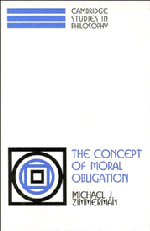Book contents
- Frontmatter
- Contents
- Preface
- Acknowledgments
- 1 Groundwork: Some distinctions
- 2 Moral obligation: An analysis
- 3 The dynamics of obligation
- 4 Conditional obligation
- 5 Prima facie obligation
- 6 Actualism and possibilism
- 7 Dilemmas
- 8 Supererogation
- 9 Cooperation
- Postscript
- Appendix: List of propositions
- List of works cited
- Index of names
- Index of subjects
6 - Actualism and possibilism
Published online by Cambridge University Press: 18 February 2010
- Frontmatter
- Contents
- Preface
- Acknowledgments
- 1 Groundwork: Some distinctions
- 2 Moral obligation: An analysis
- 3 The dynamics of obligation
- 4 Conditional obligation
- 5 Prima facie obligation
- 6 Actualism and possibilism
- 7 Dilemmas
- 8 Supererogation
- 9 Cooperation
- Postscript
- Appendix: List of propositions
- List of works cited
- Index of names
- Index of subjects
Summary
THE DISPUTE
Rick has received an invitation to review a book. It would be deontically best if he accepted the invitation and submitted his review on time. The trouble is, if he accepted, he would not submit the review on time, although he could. Perhaps it is just because he is lazy, perhaps it is because he has taken on a great many other tasks, but the fact is that this task, though accomplishable, would remain unaccomplished. It would be deontically better for him to decline the invitation than to accept it but fail to submit the review on time; for then, at least, someone else could be invited to do it, someone less qualified but someone who would get the job done. What ought (overall) Rick to do, accept the invitation or decline it?
The situation may be pictured as in Figure 6.1 (where A stands for “accept” and S for “submit”), and it may be represented as in Chart 6.1. With the case so understood, it is clear what the present account of overall obligation implies: Rick ought to accept the invitation. But a number of philosophers believe that this is the wrong answer; they believe that Rick ought to decline the invitation. This is not because they are unsympathetic with the general idea that one ought to do one's deontic best; on the contrary, they are impressed by the fact that Rick would do better if he declined the invitation than if he accepted it, and it is for this reason that they believe he ought to decline it.
- Type
- Chapter
- Information
- The Concept of Moral Obligation , pp. 189 - 206Publisher: Cambridge University PressPrint publication year: 1996



